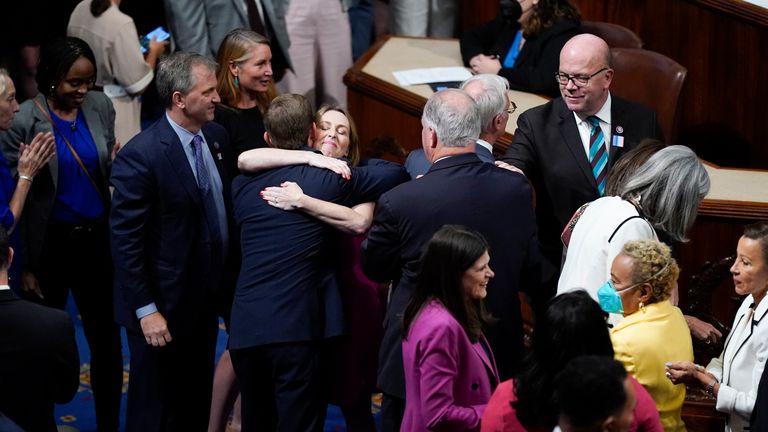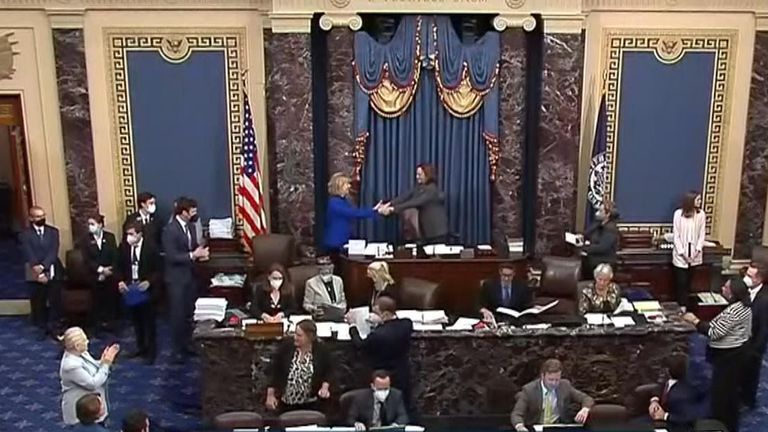A bill that aims to help the United States meet its climate goals has overcome the last hurdle and is expected to be signed into law by President Joe Biden next week.
The Inflation Reduction Act is a drastically curtailed version of a previous Biden-backed bill that was blocked by non-conformist Democratic senators, but will still lead to major reductions in greenhouse gas emissions, experts say.
After clearing the Senate on Monday – with Vice President Kamala Harris having to use her vote to pull it off as the vote was split 50-50 – the bill was passed by the House of Representatives on Friday.
Tweeting a smiling photo of him as he watched the footage of the bill being passed in Congress, Biden said on Twitter: “The choice we face as Americans is whether to protect the already powerful or find the courage to build a future in which all. has a chance.
“Today, I proudly watched how Democrats in the House chose families over special interests.”
He went on to say, “I want to thank the Democrats in Congress for supporting the Inflation Reduction Act. It required a lot of compromise. Doing important things almost always does. I can’t wait to sign it into law.”
The bill also aims to reduce medical bills for older Americans, but it raises some corporate tax rates and introduces other measures to recover the money needed to pay for everything.
Republicans attacked the bill, saying it was a shopping “wish list” that would harm an inflation-burdened economy, kill jobs, raise energy costs, and undermine growth at a time when the economy is facing a potential recession.
But House Speaker Nancy Pelosi, the House’s top Democrat, said: “Today is truly a glorious day for us. Let’s send a monumental bill to the President’s desk that will truly be for the people.”
Economists say the legislation could help the Federal Reserve fight inflation, but they don’t expect a significant impact on the economy in the coming months.
The bill plans to provide $ 370 billion in climate-focused spending, with incentives to encourage the purchase of energy-efficient electric vehicles and appliances and to motivate new investments in wind and solar energy.
The United States has pledged to cut its greenhouse gas emissions in half from 2005 levels by 2030 last year COP26 Climate Summit in Glasgow.
Princeton University’s Repeat project modeling says the bill will double the amount of new clean electricity generation capacity that will come into operation by 2024.
This would help put the United States on track to achieve their commitment.
Environmental groups have broadly embraced the bill, but said rules that would allow the federal government to authorize new wind and solar power developments on federal land only when it auctioned off rights to drill oil and natural gas would extend the law. US use of fossil fuels.
The provision was introduced by one of the Democratic senators who opposed Biden’s original bill, Joe Manchin, representing West Virginia’s coal producer.
The legislation also allows the Medicare federal health plan to negotiate lower prices for prescription drugs, in the same way that the NHS negotiates drug prices in the UK.
Juliette Cubanski, deputy director of the Medicare program at the Kaiser Family Foundation, said this would lower drug costs for the government, employers and patients.
The non-party congressional budget office estimates Medicare will be able to save $ 101.8 billion over 10 years through negotiations.
The pharmaceutical industry argues that price negotiation will limit innovation.
It comes among reports that the pharmaceutical industry spent more than any other industry in the past year lobbying Congress – at least $ 142 million.
Democrats also say the bill will reduce the budget deficit.
What’s in the bill?
£ 375 billion over 10 years to encourage industry and consumers to move from carbon-emitting forms of energy to cleaner forms of energy.
This includes $ 4 billion to tackle the drought in the western United States.
Spending, tax credits and loans will aim to encourage the hiring of:
• Clean energy technologies, such as solar panels, electric cars and energy-efficient appliances
• Consumer efforts to improve home energy efficiency, such as retrofitting homes with heat pumps and electric water heaters
• Emission reduction equipment, such as carbon capture, for coal and gas fired power plants
• Air pollution controls for ports and low-income communities
• Programs to enrich the soil and other efforts to promote climate-friendly agriculture
Experts say that, combined with last year’s $ 1.2 trillion infrastructure bill, the Inflation Reduction Act represents the largest injection of government money into energy programs since the Manhattan Project.



